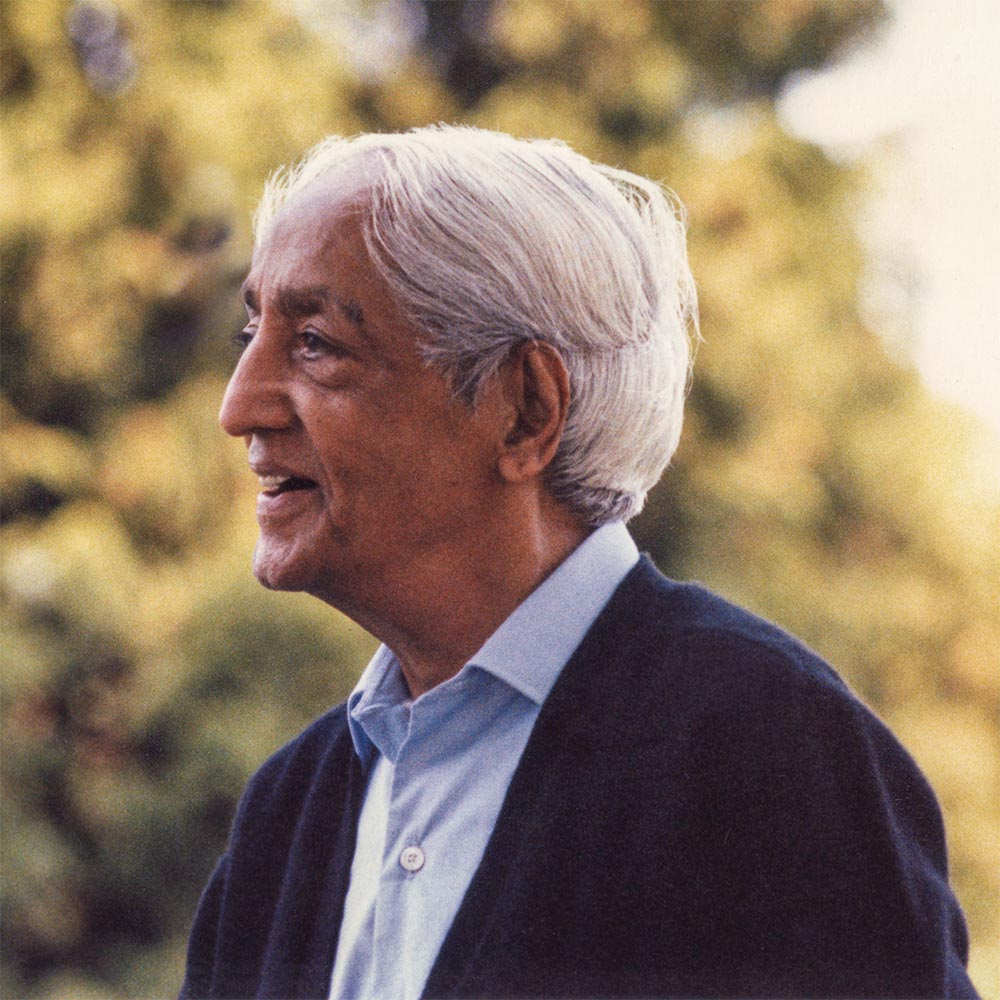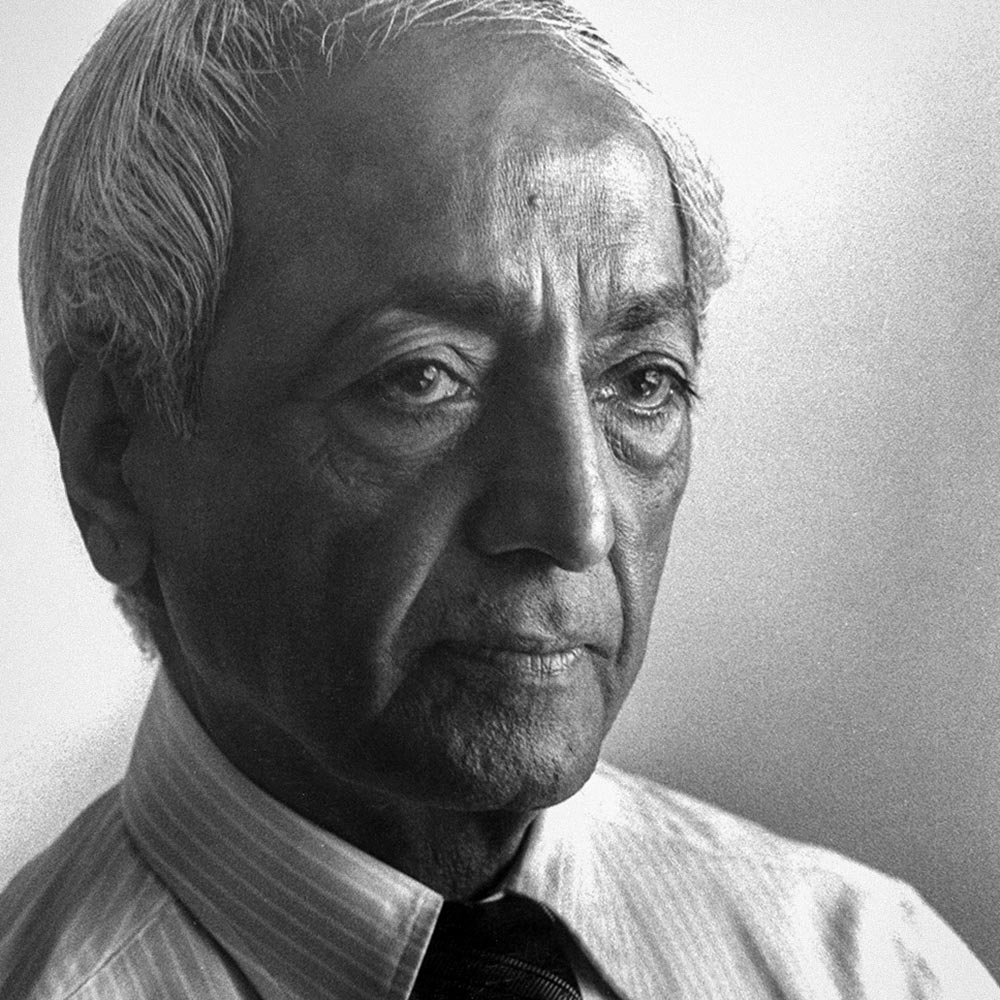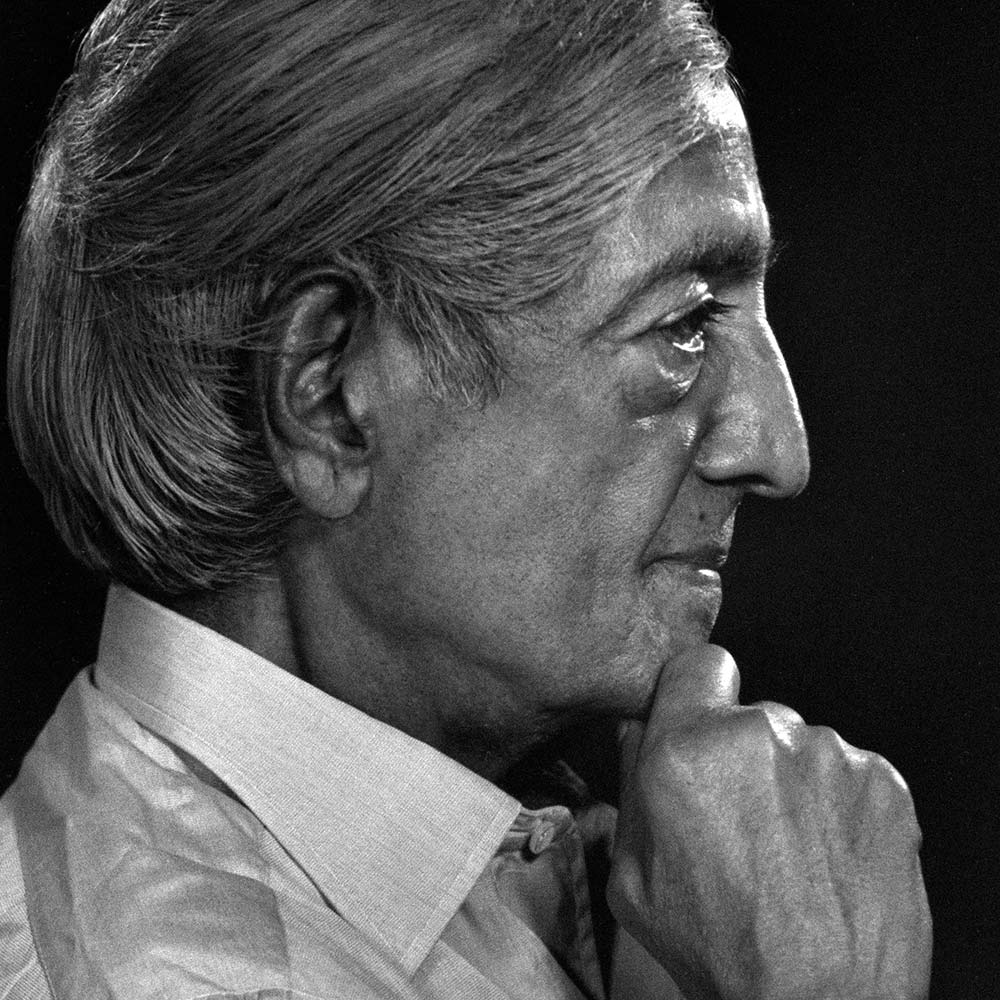Can the mind, which has created our problems, resolve those things that it has itself brought forth?
Krishnamurti, The First and Last Freedom
Read More
Thinking has not solved our problems. The clever ones, the philosophers, the scholars, the political leaders, have not really solved any of our human problems – which are the relationship between you and another, between you and myself. So far we have used the mind, the intellect, to help us investigate the problem and thereby are hoping to find a solution. Can thought ever dissolve our problems? Is not thought, unless it is in the laboratory or on the drawing board, always self-protecting, self-perpetuating, conditioned? Is not its activity self-centred? And can such thought ever resolve any of the problems which thought itself has created? Can the mind, which has created the problems, resolve those things that it has itself brought forth?
The mind would be lost without the worry of problems. It feeds on problems, whether they are world or household problems, political or personal, religious or ideological.
Krishnamurti, Commentaries on Living 1
Read More
What you are, the world is. So your problem is the world’s problem.
Krishnamurti, The First and Last Freedom
Read More
It is love alone that can solve all human problems.
Krishnamurti, The First and Last Freedom
Read More
Let us see what our problems are, not how to solve them, not what to do about them, because the moment we understand what the problem is, that very understanding brings about its own action.
Krishnamurti, You Are the World
Read More
Only a mind and a heart broken up in fragments creates problems.
Krishnamurti, The Impossible Question
Read More
No problem is something separate, all by itself. It is related to other issues, other problems.
Krishnamurti, Beginnings of Learning
Read More
If we could treat the whole of existence as one unitary movement, perhaps we would be able to solve our problems intelligently and reasonably.
Krishnamurti, The Awakening of Intelligence
Read More
After millions of years, we have not solved our problems: we are cutting each other’s throats, we are competing with each other, we hate each other, we want to be successful. This whole pattern has been repeated from the time man began, and we are still at it.
Krishnamurti, The Network of Thought
Read More
Problems are becoming more and more complex, more and more insoluble, so we must find out if it is possible to approach life in a different way, not through thought, because thought does not solve our problems.
Krishnamurti, The Network of Thought
Read More
We think knowledge is going solve our problems, whether the knowledge of the priest, the guru, the scientist, the philosopher or the latest psychiatrist. But we have never questioned whether knowledge in itself can solve any of our problems.
Krishnamurti, The Network of Thought
Read More
As a pool is still when the breezes stop, so the mind is still with the cessation of problems.
Krishnamurti, Commentaries on Living 1
Read More
How anxious we are to find an answer to our problems! We are so eager to find an answer that we cannot study the problem; it prevents our silent observation of the problem. The problem is the important thing, and not the answer. If we look for an answer, we will find it; but the problem will persist, for the answer is irrelevant to the problem. Our search is for an escape from the problem, and the solution is a superficial remedy, so there is no understanding of the problem. All problems arise from one source, and without understanding the source, any attempt to solve the problems will only lead to further confusion and misery. One must first be very clear that one’s intention to understand the problem is serious, that one sees the necessity of being free of all problems, for only then can the maker of problems be approached. Without freedom from problems, there can be no tranquillity, and tranquillity is essential for happiness – which is not an end in itself. As a pool is still when the breezes stop, so the mind is still with the cessation of problems. But the mind cannot be made still; if it is, it is dead, a stagnant pool. When this is clear, then the maker of problems can be observed. The observation must be silent and not according to any predetermined plan based on pleasure and pain.
The very nature of our mind is to be dishonest, crooked, incapable of facing facts, and that is the thing which creates problems; that is the thing which is the problem itself.
Krishnamurti, The First and Last Freedom
Read More
We have made God a problem, we have made love a problem, we have made relationship and living a problem, and we have made sex a problem. Why?
Krishnamurti, The First and Last Freedom
Read More
Wherever one goes in the world, human beings are more or less the same. Their manners, behaviour and patterns of action may differ, but psychologically, inwardly, their problems are the same.
Krishnamurti, You Are the World
Read More
These quotes only touch on the many subjects Krishnamurti inquired into during his lifetime. His timeless and universal teachings can be explored using the Index of Topics where you will find texts, audio and video related on many themes. Another option is to browse our selection of curated articles or more short quotes. Krishnamurti’s reply when asked what lies at the heart of his teachings can be found here. Many Krishnamurti books are available, a selection of which can be explored here. To find out more about Krishnamurti’s life, please see our introduction and the biography. We also host a weekly podcast, and offer free downloads. Please visit our YouTube channel for hundreds of specially selected shorter clips. Below, you can learn more about Krishnamurti and our charity which he founded in 1968.

Who Was Krishnamurti?
J. Krishnamurti (1895-1986) is widely regarded as one of the greatest thinkers and religious teachers of all time. He spoke throughout the world to large audiences and to individuals, including writers, scientists, philosophers and educators, about the need for a radical change in mankind. Referring to himself, Krishnamurti said:
He is acting as a mirror for you to look into. That mirror is not an authority. It has no authority, it’s just a mirror. And when you see it clearly, understand what you see in that mirror, then throw it away, break it up.
Krishnamurti was concerned with all humanity and held no nationality or belief and belonged to no particular group or culture. In the latter part of his life, along with continuing to give public talks, he travelled mainly between the schools he had founded in India, Britain and the United States, which educate for the total understanding of man and the art of living. He stressed that only this profound understanding can create a new generation that will live in peace.
Krishnamurti reminded his listeners again and again that we are all human beings first and not Hindus, Muslims or Christians, that we are like the rest of humanity and are not different from one another. He asked that we tread lightly on this earth without destroying ourselves or the environment. He communicated to his listeners a deep sense of respect for nature. His teachings transcend man-made belief systems, nationalistic sentiment and sectarianism. At the same time, they give new meaning and direction to mankind’s search for truth. His teaching is timeless, universal and increasingly relevant to the modern age.
I am nobody. It is as simple as that. I am nobody. But what is important is who you are, what you are.
Krishnamurti
Krishnamurti spoke not as a guru but as a friend. His talks and discussions are based not on tradition-based knowledge but on his own insights into the human mind and his vision of the sacred, so he always communicated a sense of freshness and directness, although the essence of his message remained unchanged over the years. When Krishnamurti addressed large audiences, people felt that he was talking to each of them personally, addressing their own particular problem. In his private interviews, he was a compassionate teacher, listening attentively to those who came to him in sorrow, and encouraging them to heal themselves through their own understanding. Religious scholars found that his words threw new light on traditional concepts. Krishnamurti took on the challenge of modern scientists and psychologists and went with them step by step, discussing their theories and sometimes enabling them to discern the limitations of their theories.
Krishnamurti left a large body of literature in the form of public talks, writings, discussions with teachers and students, scientists, psychologists and religious figures, conversations with individuals, television and radio interviews, and letters. Many of these have been published as books, in over 60 languages, along with hundreds of audio and video recordings.

The Krishnamurti Foundation
Established in 1968 as a registered charity, and located at The Krishnamurti Centre, Krishnamurti Foundation Trust exists to preserve and make available Krishnamurti’s teachings.
The Foundation serves a global audience by providing worldwide free access to Krishnamurti videos, audio and texts to those who may be interested in pursuing an understanding of Krishnamurti’s work in their own lives.
In describing his intentions for the Foundations, Krishnamurti said:
The Foundations will see to it that these teachings are kept whole, are not distorted, are not made corrupt.

